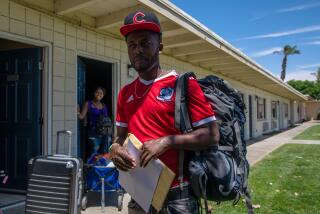Albania Pressed to Halt Child Trafficking
- Share via
SPITALLA, Albania — Fatmira Bonjaku lined up her seven children outside the family’s two-room shack in western Albania so that an elderly Italian couple could pick one to take home.
As the sad ritual played out four years ago in Europe’s poorest country, Bonjaku suggested that they take her eldest son, but the man insisted on 3-year-old Oracio.
“Out of all the children, he liked Oracio,” she said. “He said, ‘I want a little child because I want him to recognize me as a parent.’ ”
A few weeks later, the Bonjaku family sent Oracio away, expecting the Italian couple to help them eventually follow their son to Italy. No money came, although she did get to keep a television set that the Italian man brought on a visit two years later.
As many as 6,000 unaccompanied children have left Albania for Greece and Italy since the fall of communism 13 years ago, many under dubious circumstances. Human rights advocates are hoping that Oracio’s case -- widely reported in the Italian and Albanian media -- will force the government to act.
Once out of Albania, many children vanish into the hidden and sordid world of child traffickers. No one knows how many have fallen victim to adults, including pimps, who force them to work without pay.
Despite the risks, parents here still send them away. This is, after all, a country full of desperate people. Nearly half the population of 3.1 million lives on $2 a day or less. In communist times, nobody left Albania. Now it’s common to send children abroad to beg, scrub toilets, wash car windows at intersections -- whatever it takes to earn money.
Misery is so common here that even reports that described Fatmira Bonjaku’s actions as a clean trade -- Oracio for the TV set -- generated little surprise and no reaction from the government. Prosecutors and police say the “trade” reports were inaccurate, and Bonjaku argues that her story has been exaggerated, making her already painful situation worse.
Always struggling, this Maryland-sized country has had a tough time adapting to post-communist disorder. About 40% of households don’t have access to running water, sanitation and heating, the World Bank says.
Although advocacy groups have banded together to fight child trafficking, the ever-bickering government did nothing until a 2001 U.S. State Department study put Albania among the most problematic countries, with an implicit threat to halt aid. Then a law against child trafficking was passed.
This year’s State Department report declared that Albania had still failed to meet the minimum standards for eliminating trafficking, but said it was trying.
A senior official dealing with organized crime, Zamir Shtylla, says his country is doing what it can, which he acknowledges isn’t much. Shaking his head, he explained that it is nearly futile to combat organized crime without computers, passport-screening equipment, extensive border patrols and even cars.
In Albania, he said, “the police walk.”
Fatmira Bonjaku, 36, and her husband Kujtim, 56, live a bleak life even by Albanian standards. Being Gypsies puts them near the bottom of the social order.
Their shack in this slum on the edge of the seaside city of Durres, 20 miles west of the capital, Tirana, has plastic sheeting for windows. Shoes discarded by neighbors litter the hard-packed dirt yard.
There’s no kitchen, bathroom, telephone or privacy. Two clotheslines of tiny T-shirts, bibs and toddlers’ underwear offer the only shield between the front door and the neighbors.
Hoping for more, Fatmira Bonjaku told prosecutors that she might have considered a legal adoption of Oracio, on condition that the Italian, Angelo Borelli, “also helped me economically,” say court documents obtained by Associated Press.
In the end, she said, her husband was swayed by an intermediary -- a friend he met while in prison on theft charges.
“My husband was like a horse,” Fatmira Bonjaku said. “He looked straight ahead. He was naive.”
To take custody of Oracio and help the family, Borelli paid a middleman $9,000, Albanian prosecutors say. When Fatmira Bonjaku realized that the middleman was taking all the cash, she went to the police.
Authorities arrested her husband and three accomplices. But there will be no charges of trafficking against the Bonjakus because Oracio left Albania before the child-trafficking ban was enacted.
Italian police arrested Borelli, 69, and his wife, Iole Rodio, 57, on charges of criminal association, illegal adoption, falsifying documents and aiding illegal immigration.
Kujtim Bonjaku remains in jail pending charges of illegally possessing a Kalashnikov automatic rifle. His absence has hit the family hard, especially after his wife gave birth in October to Reidana, their eighth child.
She’s taking maternity leave from her street-cleaning job, so the family is getting by on about $75 a month, including child assistance. There are also occasional handouts, like the sack of flour brought by authorities on a horse-drawn cart.
Oracio, meanwhile, is in protective custody in Italy. His mother would like to see him again, and feels stung by the criticism that she has received over the TV set.
She denies that she tried to sell him or trade him for a TV set that only came two years later.
“If I had sold the child, as it is said, I would not be in this situation,” she said, waving vaguely at the clothesline.
“If I had sold him, I could be very rich.”
*
Associated Press reporters Llazar Semini in Albania and Garentina Kraja in Kosovo contributed to this report.
More to Read
Sign up for Essential California
The most important California stories and recommendations in your inbox every morning.
You may occasionally receive promotional content from the Los Angeles Times.













